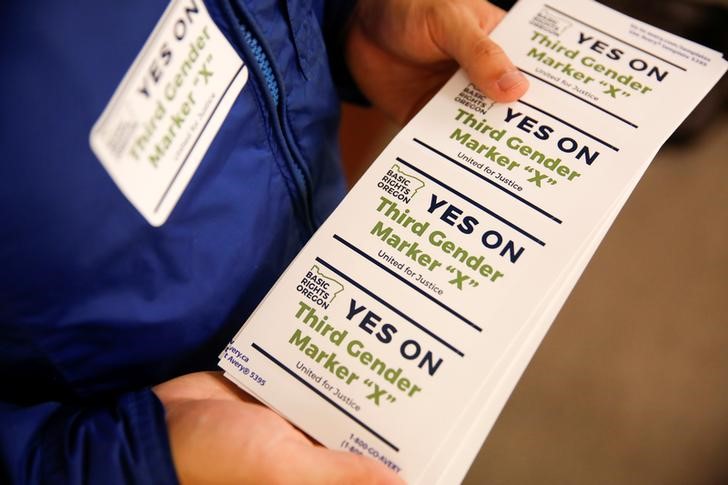
An employee of the advocacy group Basic Rights Oregon hands out stickers during an Oregon Driver and Motor Vehicle department public hearing on the rights of transgender people as the state considers adding a third gender choice to driver’s licenses and identification cards, in Portland, Oregon, May 10, 2017. Credit: Reuters/Terray Sylvester
Portland, Oregon: Oregonians may soon be able to identify themselves as neither male nor female as Oregon works toward becoming the first US state to allow a third gender option on its drivers’ licenses and state identification cards.
Last June, Multnomah County Circuit Court judge Amy Holmes Hehn granted a request by Army veteran Jamie Shupe, who has been transitioning since 2013, to change the retired sergeant’s gender from female to a third, nongender option. It was believed to be the first decision of its kind in the US.
“I deserve the right to properly classify my identity here on the homeland,” Shupe said in an email to Reuters on Tuesday.
The rights of transgender people along with public policy involving gender have become polarising issues across the United States, most notably in several states, including North Carolina, which have tried to address the use of public bathrooms.
Since Shupe’s request was granted, Oregon‘s Department of Motor Vehicles has been researching the state’s gender laws and determining how to incorporate the third option into state computer systems, DMV spokesman David House said.
“It was new territory for everybody,” House told Reuters on Tuesday, noting that no other state offers a third gender choice.
To add a third gender option, the DMV must change administrative rules. It does not need approval from the state legislature, House said.
Oregon‘s DMV has also fielded comments from the public, holding a hearing on the subject in Eugene last week, with another hearing on Wednesday evening in Portland, where about a dozen people spoke in support of the change and no one spoke against it.
“Let’s be real. This is about disrupting the system because it’s wrong,” Stuart Getty, 35, a writer and filmmaker in Portland said to applause. “Let’s change it now.”
Most public comments have been supportive of the change, while a handful have questioned the need and whether this would complicate police efforts to identify people, House said.
House said he expects the third option on state licenses and identification cards to be available before the end of July.
The nongender status will appear as an ‘X’ on an ID card or driver’s license, he said.
“I’ll display my X with pride to anyone,” Shupe said. “This ID will do just that: celebrate and recognise my uniqueness instead of ostracising me for it.”
(Reuters)